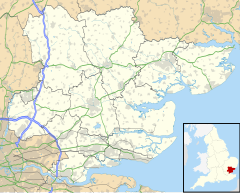Greensted
This article needs additional citations for verification. (November 2014) |
| Greensted | |
|---|---|
 Greensted Church is believed by many to be the oldest wooden church in the world | |
Location within Essex | |
| Civil parish | |
| District | |
| Shire county | |
| Region | |
| Country | England |
| Sovereign state | United Kingdom |
| Post town | Ongar |
| Postcode district | CM5 |
| Dialling code | 01277 |
| Police | Essex |
| Fire | Essex |
| Ambulance | East of England |
| UK Parliament | |
Greensted is a village and (as Greenstead) a former civil parish, now in the parish of Ongar, Essex, England, strung out along the Greensted Road approximately one mile to the west of Chipping Ongar. In 1961 the parish had a population of 711.[1]
Toponymy
[edit]Greensted's full name is Greensted-juxta-Ongar. Greensted means green place, sted being in the Anglo-Saxon language, the old word for place (and is still used in modern English words e.g. 'instead', 'steadfast'). 'Juxta', from the Latin iuxta, means 'alongside'.
Greensted is situated in a large natural clearing, and would have been a logical place to build a settlement in the dense surrounding Epping Forest especially as it was near an existing route, the Ongar road, later part of the Canterbury pilgrimage mentioned in The Canterbury Tales.
History
[edit]Greensted is important because of its longevity: the parish has existed since Saxon times. It is also a place that has strong ties with St Edmund, King of East Anglia. King Edmund's body stayed in the church in 1013 after being moved from its normal resting place in Bury St Edmunds.[2]
On 1 April 1965 the parish was abolished to form Ongar.[3]
Landmarks
[edit]While very small, Greensted does have one particular feature of note, being St Andrew's Church, commonly known as Greensted Church, the oldest wooden church in the world. It was featured on a British postage stamp issued in April 1972.[4] The east end, of brick construction, dates from the sixteenth century, while the brick footings, visible below the timber walls, are a feature of extensive restoration undertaken in the nineteenth century
See also
[edit]References
[edit]- ^ "Population statistics Greenstead AP/CP through time". A Vision of Britain through Time. Retrieved 22 December 2021.
- ^ Hadfield, J. (1970). The Shell Guide to England. London: Michael Joseph.
- ^ "Relationships and changes Greenstead AP/CP through time". A Vision of Britain through Time. Retrieved 22 December 2021.
- ^ Stanley Gibbons Stamp Catalogue (1982), Part 1: British Commonwealth. London: Stanley Gibbons Publications Ltd., p GB 24.
External links
[edit] Media related to Greensted at Wikimedia Commons
Media related to Greensted at Wikimedia Commons- Greensted Network

